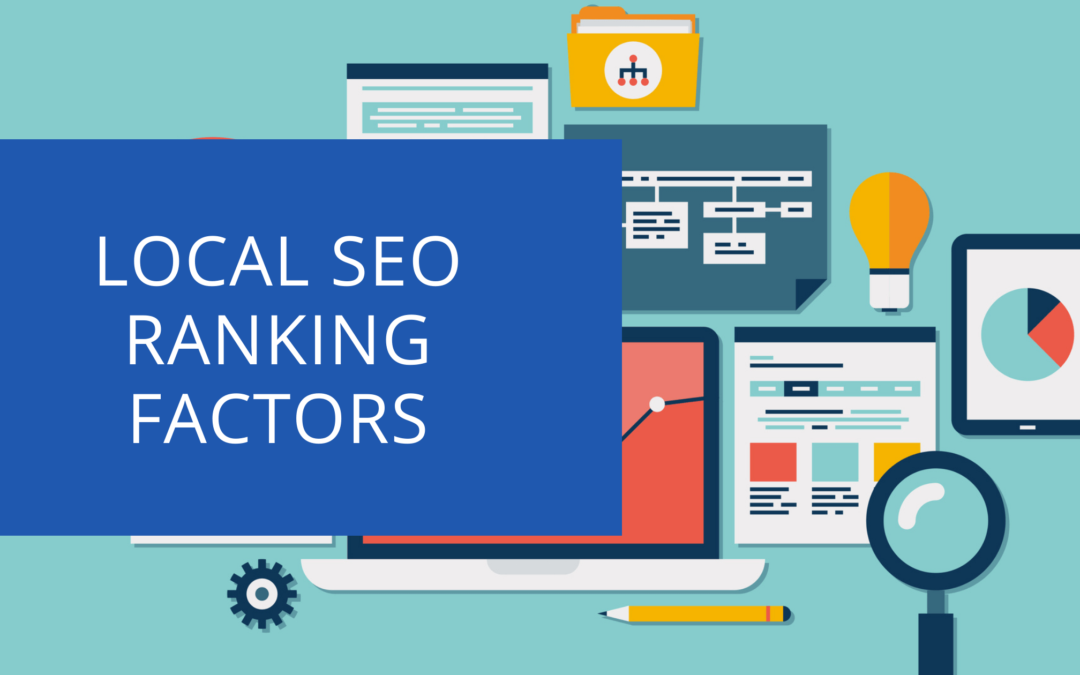Are you a local business owner? If so, then you need to be thinking about your website’s ranking in the search engines. There are a lot of different factors that go into how your site is ranked and if it does not rank well, then no one will find it through Google searches.
In this blog article, we will go through the most important aspects for ranking in local organic results.- based on the data from 2021’s Local Search Ranking Factors survey from Whitespark. We will discuss 15 local SEO ranking factors that matter to your website. By following these steps, you will be able to get better rankings!
Contents
15 Local SEO Ranking Factors
The quality and authority of links to your website are a huge ranking factor. You need to make sure that you are getting high-quality backlinks from other websites. The best way to do this is by publishing great content that people will want to share.
You can also use tools like Majestic or ahrefs to see which websites are linking back to you and how authoritative those links are.
If you find that you are not getting as many high-quality links as you would like, then start reaching out to more influential bloggers and ask them to link back to your site.
Remember, the better the quality of your links, the higher your website will rank in the search engines!
Volume of quality content on your entire website
 Another ranking factor that is important for local businesses is the volume of quality content on your website. Google wants to see that you are publishing high-quality content on a regular basis. This tells them that you are an authority in your field and that people can trust your website.
Another ranking factor that is important for local businesses is the volume of quality content on your website. Google wants to see that you are publishing high-quality content on a regular basis. This tells them that you are an authority in your field and that people can trust your website.
If you want to improve your website’s ranking, then start publishing more high-quality content!
Make sure to include images, infographics, and videos in your content as this will help it rank better in the search engines.
Internal linking across your entire website
Internal links are links within your website that point to other pages on your site. These help search engines understand how different parts of your website relate to each other which will improve the ranking of all of those pages in organic results.
You can use internal linking by including hyperlinks within blog posts, creating a navigation menu at the top or bottom of every page, and using anchor text throughout content like “here” or “read more”.
Topical (product/service) keyword relevance across your entire website
Another ranking factor that Google looks at is the topical relevance of your website. This means that they want to see that you are targeting the correct keywords with your content.
For local businesses, it is important to target keywords that are relevant to their products or services. You can use tools like Google AdWords Keyword Planner and Google Trends to find out which keywords are being searched for the most.
Once you have targeted a few good keywords, make sure to include them throughout your website’s content!
Geographic (city/town) keyword relevance of your website content
The last local SEO ranking factor that is important to your website’s rank in the search engines is geographic relevance.
If you are trying to rank well for keywords related to a specific city or town, then make sure that this location is mentioned throughout your content! You can do this by including words like “London” or “Liverpool”. This will help Google connect all of your content and show it as relevant.
Keywords in your landing page title
The title of your landing page is one of the most important on-page SEO factors. You need to make sure that it includes your target keywords and is as descriptive as possible.
For local businesses, it is important to target the correct keywords with their content. You can use tools like Google AdWords Keyword Planner and Google Trends to find out which keywords are being searched for the most.
Once you have targeted a few good keywords, make sure to include them in the title of your landing page! This will help improve your website’s ranking in organic results.
Your website’s degree of focus on a specific niche
A website’s focus on a specific niche is also a ranking factor that Google looks at. They want to see that you are targeting the correct keywords with your content, and covering as much as possible for your niche, and that you are not trying to be all things to all people.
Keywords in the anchor text of inbound links to your domain
 Backlinks are links from other sites back to your website. These help search engines understand how different parts of the web relate to each other which will improve the ranking of all of those pages in organic results.
Backlinks are links from other sites back to your website. These help search engines understand how different parts of the web relate to each other which will improve the ranking of all of those pages in organic results.
The anchor text is the clickable words that appear with a hyperlink, and Google wants you to use targeted keywords in this section when linking between pages on your site or pointing it out in an article somewhere. This tells them that you are targeting specific keywords with content on your website, just like they want!
So having keywords in the anchor text of your inbound links is a must if you want your website to rank higher in the search engines.
Quantity of inbound links to your domain from locally-relevant domains
The quantity of inbound links is also a ranking factor that Google looks at. They want to see that you have a good number of high-quality links from other websites that are related to your geographical area or the geographical area(s) targetted.
A website’s domain authority is another ranking factor that Google looks at. They want to see that your site has a good amount of trust in the eyes of other webmasters, which is determined by how many links you have pointed towards your website coming from authoritative domains.
Quantity of inbound links to your domain from industry-relevant domains
In addition to local-relevant domains, Google also looks at the number of inbound links coming from industry-relevant domains. This means that you should try and get links from websites in the same niche as your website.
This will show Google that you are an authority on the subject matter, and will help improve your ranking in organic results.
For example, if you have a website about mobile phone accessories and want to rank well for “iPhone cases”, then try getting links from other iPhone case review sites or manufacturer websites!
This will help improve your domain relevance as it is related to the keywords that you are targeting with content on your site. Put yourself in Google’s shoes and do what you would want to see if you were looking for information on your product or service.
Mobile-friendly website
Having a mobile-friendly website is an on-page SEO factor that Google looks at. They want to see if your site works well when viewed from their different platforms and devices, which includes smartphones and tablets.
Many people access the internet using these portable devices nowadays, so you need to make sure that your content can be easily accessed by them! If not, then your ranking in organic results will suffer because of it.
So having a responsive design or one designed specifically for mobile users helps improve how Google sees your website’s user experience (UX), which means they’ll rank you better in organic search results!
Volume of quality content on your service pages
Having quality content on your service pages is another SEO ranking factor that Google looks at.
They want to see if you have enough in-depth, helpful information for users looking to solve a specific problem or task via the internet. If so, then this tells them that you are an authority in solving their problems and gives weight to what they say when it comes time for rankings!
So having one page per topic will help improve how Google sees your website’s relevancy with your keywords, which means better organic search results over time! This can lead to more traffic from web searchers who are actively trying to find solutions online rather than just browsing casually about topics.
Diversity of inbound links to your domain from
 Having a diversity of inbound links coming from different IP addresses is another SEO ranking factor that Google looks at. They want to see how many different websites are linking back to your website, and if they’re all from the same place then it won’t look good for you!
Having a diversity of inbound links coming from different IP addresses is another SEO ranking factor that Google looks at. They want to see how many different websites are linking back to your website, and if they’re all from the same place then it won’t look good for you!
So try getting links from other sites or webmasters which have multiple ways onto their site (e.g., social profiles, citations, blog comments, forums posts, guest blogs).
This will help improve your domain authority as it shows more trustworthiness with the search engines because there’s probably a lot going on behind-the-scenes leading up to those links being placed!
So having a variety of sources pointing back towards your domain helps increase how much weight Google assigns to your site, which can result in better rankings over time!
Google also looks at the keywords that are used in your landing page’s H tags.
They want to see if you’re targeting specific keywords on your page and if they match up with what users are searching for. If so, then this tells them that you have relevant content on your site which can help improve your ranking in organic results!
Please use the following guides to optimise for the above ranking factors:
- Building Backlinks for SEO: https://mediakynect.co.uk/how-to-build-backlinks-for-seo/
- Guest Posting: https://mediakynect.co.uk/guest-posting-seo/
- Broken Link Building: https://mediakynect.co.uk/broken-link-building-seo/
- How to Write Amazing Content: https://mediakynect.co.uk/how-to-write-amazing-content-seo/
- How to Improve Your Internal Linking: https://mediakynect.co.uk/improve-internal-linking-seo/
- How to Do Keyword Research: https://mediakynect.co.uk/how-to-do-keyword-research-for-seo/
- Tips for Optimising Your SEO Content: https://mediakynect.co.uk/tips-optimise-seo-content/
Local SEO Ranking Factors FAQ
What are some other on-page SEO factors that Google looks at?
Some other on-page SEO factors that Google looks at include the following: title tags, meta descriptions, image alt text, internal linking structure, and website load time.
How can I make sure my website is mobile-friendly?
You can use Google’s Mobile-Friendly Test tool to check how your website fares against their standards! If it doesn’t pass then you’ll need to make some changes so that your site becomes more mobile-friendly. There are also many responsive design templates available online which will help you convert your site into a mobile version without having to create a separate one altogether.
 Domain authority (DA) is a metric created by Moz which measures a website’s overall ability to rank in search engines. SEO’s also use ahref’s DR (Domain Rating).
Domain authority (DA) is a metric created by Moz which measures a website’s overall ability to rank in search engines. SEO’s also use ahref’s DR (Domain Rating).
You can improve this metric by getting links from high-quality websites, optimising your on-page SEO factors, and publishing helpful content that people will want to share!
What is a crawl budget and how can I use it to improve my website’s SEO?
A crawl budget is the number of pages Googlebot is allowed to crawl on your website every day. You can use this metric to determine whether you need to free up some resources (e.g., bandwidth, CPU usage) so that Googlebot can crawl more pages on your site.
You can also use it as a way to measure how efficiently your website is being crawled by the search engine! Improving your website’s crawl budget can help improve its overall SEO ranking over time.
What are some common mistakes people make with their local SEO efforts?
Some common mistakes people make with their local SEO efforts include not being able to be found in the local pack results, not having a physical address on their website’s contact page, and not optimising their on page to target their geographical area.
Why are reviews important for improving your website’s SEO?
Reviews from trusted sources such as Yelp or Google My Business help improve trust between users searching online and your site because it shows them whether you’re trustworthy enough to provide quality services!
Having these types of reviews also helps with how much weight Google gives your search rankings in both the map listings and organic listings.
We Offer SEO Services Nationwide
- Chester:https://mediakynect.co.uk/seo-chester/
- Wirral: https://mediakynect.co.uk/seo-wirral/
- Liverpool: https://mediakynect.co.uk/seo-liverpool/
- North Wales: https://mediakynect.co.uk/seo-north-wales/
- Wrexham: https://mediakynect.co.uk/seo-wrexham/
Conclusion
So there you have it – the top local SEO ranking factors that Google takes into consideration when indexing and ranking websites.
There are many ranking factors that Google looks at when it comes to determining the rank of a website in the local search results.
By following the advice listed above, you can improve how your site is seen by the search engine and potentially increase your rankings over time!

